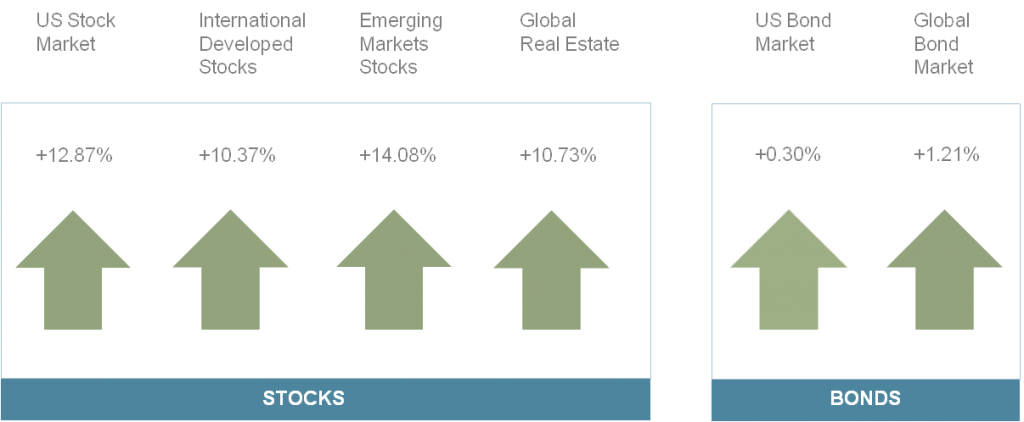
Should Investors Buy High-Dividend Stocks?
With bond yields still hovering around historic lows, some investors may be tempted to consider dividend-paying stocks as a way of generating income from their portfolios, presumably with the benefit of not having to sell from their principal. But before embarking onthis strategy, it is important to understand several considerations:
- SIMPLE MATH: When firms make dividend payments, it is relatively common for the stock price to decrease on the ex-dividend date by an amount roughly equal to the dividend paid. For example, an investor holding 10 shares of a stock priced at $100 per share has a total account value of $1,000. If the stock pays a dividend of $5 per share, the stock price would generally drop to $95 on the ex-dividend date, so the investor’s overall account value does not change due to dividend payments. If the investor takes the dividend in cash, he would have $950 in the stock and $50 in cash. Taking the dividend payment in cash for spending purposes actually reduces the principal value of the account. The same principle applies to distributions in mutual funds.
- TOTAL RETURN: The total return of holding a stock is the sum of its dividend payments and price appreciation, and that sum is what should really matter to investors, not just the dividend. Until this quarter, Apple chose to reinvest its profits rather thanpay dividends, and over the past decade it has been one of the best-performing stocks in the US market. Should investors have stayed away from Apple just because it wasn’t paying dividends? Many small cap stocks reinvest their earnings and don’t pay dividends, yet as an asset class have higher expected returns than large cap stocks.
- TAXES: Until a few years ago, many investors purposefully avoided dividend-paying stocks because of the high tax rates, which were lowered in 2003 to 15% for most qualified dividends. Unless Congress takes action, the top tax rate for the highest earners is set to jump to 43.4% next year, as reported in the Wall Street Journal. That is a maximum income tax rate of 39.6%—since dividends will once again be taxed as regular income—plus a 3.8% tax on investment income as part of the healthcare overhaul passed in 2009.
Dividend-paying stocks certainly have a place is a holistic portfolio, but such a strategy should not supersede other fundamental tenets of investing, such as diversification and focusing on the sources of risk and expected return. Generating lifetime income from an investment portfolio is too complex of an issue to be solved by simply chasing stocks with high dividend yields.
By Apollo D. Lupescu, PhD, vice president.
This information is provided for educational purposes only and should not be considered investment advice or a solicitation to buy or sell securities. Dimensional Fund Advisors LP is an investment advisor registered with the Securities and Exchange Commission. Funds/indices selected are not similar to client portfolios in that they include securities and/or strategies not employed by MFA. This is not an offer to buy or sell securities.
Index performance does not reflect the expenses associated with the management of an actual portfolio. Past performance is not a guarantee of future results. Market segment (index representation) as follows: US Stock Market (Russell 3000 Index); International Developed Stocks (MSCI World ex USA Index [net div.]), Emerging Markets (MSCI Emerging Markets Index [net div.]), Global Real Estate (S&P Global REIT Index), US Bond Market (Barclays Capital US Aggregate Bond Index), and Global Bond Market (Barclays Capital Global Aggregate Bond Index [Hedged to USD]). The S&P data are provided by Standard & Poor’s Index Services Group. Russell data copyright © Russell Investment Group 1995–2012, all rights reserved. MSCI data copyright MSCI 2012, all rights reserved. Barclays Capital data provided by Barclays Bank PLC. US long-term bonds, bills, and inflation data © Stocks, Bonds, Bills, and Inflation Yearbook™, Ibbotson Associates, Chicago (annually updated work by Roger G. Ibbotson and Rex A. Sinquefield).

